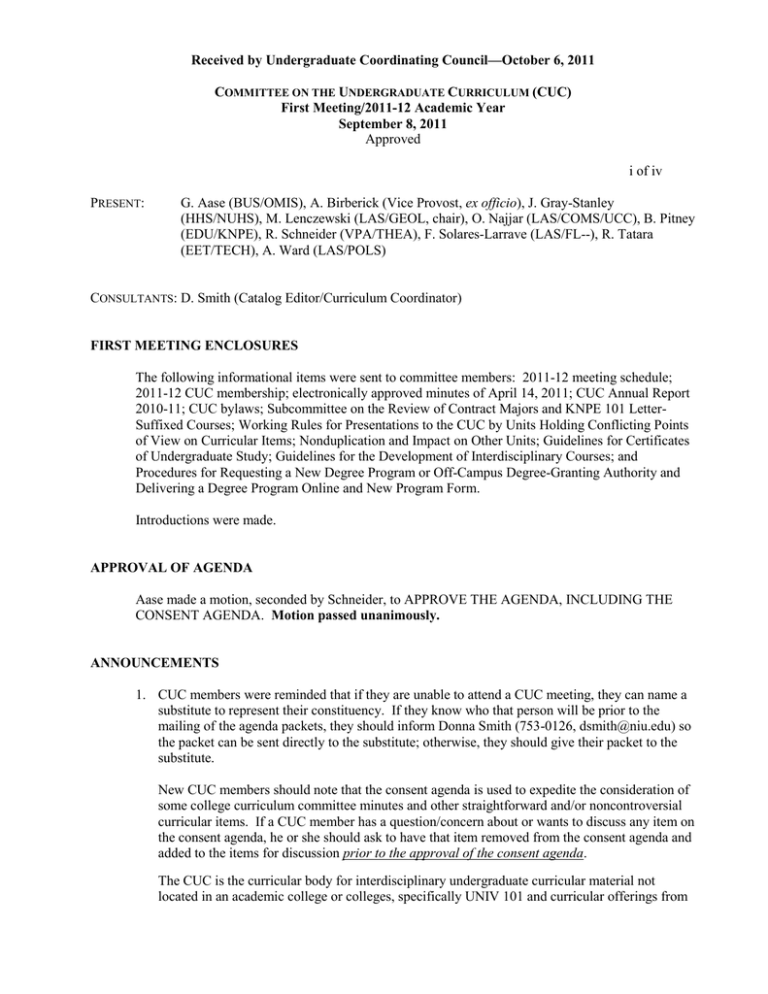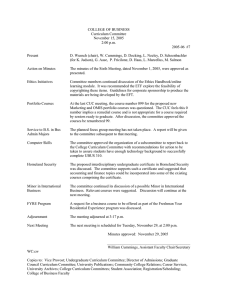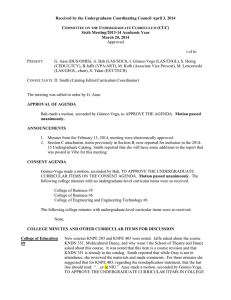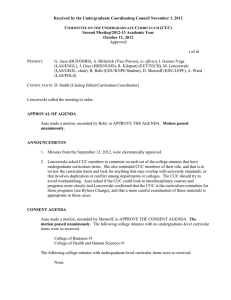Document 15173546
advertisement

Received by Undergraduate Coordinating Council—October 6, 2011 COMMITTEE ON THE UNDERGRADUATE CURRICULUM (CUC) First Meeting/2011-12 Academic Year September 8, 2011 Approved i of iv PRESENT: G. Aase (BUS/OMIS), A. Birberick (Vice Provost, ex officio), J. Gray-Stanley (HHS/NUHS), M. Lenczewski (LAS/GEOL, chair), O. Najjar (LAS/COMS/UCC), B. Pitney (EDU/KNPE), R. Schneider (VPA/THEA), F. Solares-Larrave (LAS/FL--), R. Tatara (EET/TECH), A. Ward (LAS/POLS) CONSULTANTS: D. Smith (Catalog Editor/Curriculum Coordinator) FIRST MEETING ENCLOSURES The following informational items were sent to committee members: 2011-12 meeting schedule; 2011-12 CUC membership; electronically approved minutes of April 14, 2011; CUC Annual Report 2010-11; CUC bylaws; Subcommittee on the Review of Contract Majors and KNPE 101 LetterSuffixed Courses; Working Rules for Presentations to the CUC by Units Holding Conflicting Points of View on Curricular Items; Nonduplication and Impact on Other Units; Guidelines for Certificates of Undergraduate Study; Guidelines for the Development of Interdisciplinary Courses; and Procedures for Requesting a New Degree Program or Off-Campus Degree-Granting Authority and Delivering a Degree Program Online and New Program Form. Introductions were made. APPROVAL OF AGENDA Aase made a motion, seconded by Schneider, to APPROVE THE AGENDA, INCLUDING THE CONSENT AGENDA. Motion passed unanimously. ANNOUNCEMENTS 1. CUC members were reminded that if they are unable to attend a CUC meeting, they can name a substitute to represent their constituency. If they know who that person will be prior to the mailing of the agenda packets, they should inform Donna Smith (753-0126, dsmith@niu.edu) so the packet can be sent directly to the substitute; otherwise, they should give their packet to the substitute. New CUC members should note that the consent agenda is used to expedite the consideration of some college curriculum committee minutes and other straightforward and/or noncontroversial curricular items. If a CUC member has a question/concern about or wants to discuss any item on the consent agenda, he or she should ask to have that item removed from the consent agenda and added to the items for discussion prior to the approval of the consent agenda. The CUC is the curricular body for interdisciplinary undergraduate curricular material not located in an academic college or colleges, specifically UNIV 101 and curricular offerings from Received by Undergraduate Coordinating Council—October 6, 2011 COMMITTEE ON THE UNDERGRADUATE CURRICULUM (CUC) First Meeting/2011-12 Academic Year September 8, 2011 Approved ii of iv the Division of International Programs and the Center for Black Studies. This responsibility includes usual curricular activity (new, revised, and deleted courses as well as other catalog changes), general education submissions/resubmissions, and review of these units’ overall curricular offerings. 2. Items previously in Section B, now reported for inclusion in the catalog (Section C). Smith explained that these are items previously approved by the CUC, but which needed approval from at least one other body (e.g., Board of Trustees, IBHE, etc.). 3. Items reported for inclusion in the catalog by another standing committee of the UCC (Section D). Smith added that these items usually come from the Academic Policies and Admissions Standards Committee, but sometimes a catalog item will come from another committee of the UCC. CONSENT AGENDA Lenczewski explained that the consent agenda contains either college curriculum committee minutes with no undergraduate curriculum items or undergraduate curriculum items that have been predetermined to need no additional discussion. Committee members are encouraged to bring forward any of these items they feel warrant additional discussion at this time of the meeting. Solares-Larrave made a motion, seconded by Gray-Stanley, to APPROVE THE CONSENT AGENDA. The motion passed unanimously. The following college minutes with no undergraduate-level curricular items were so received. College of Business #12 (AY 10-11) College of Education #11 (AY 10-11) College of Education #12 (AY 10-11) College of Education #13 (AY 10-11) College of Engineering and Engineering Technology #8 (AY 10-11) College of Engineering and Engineering Technology #9 (AY 10-11) College of Engineering and Engineering Technology #10 (AY 10-11) College of Engineering and Engineering Technology #11 (AY 10-11) College of Engineering and Engineering Technology #12 (AY 10-11) The following college minutes with undergraduate-level curricular items were so received. College of Business #11 (AY 10-11) College of Business #13 (AY 10-11) College of Education #14 (AY 10-11) (pending APASC approval) College of Liberal Arts and Sciences #9 (AY 10-11) College of Liberal Arts and Sciences #11 (AY 10-11) Received by Undergraduate Coordinating Council—October 6, 2011 COMMITTEE ON THE UNDERGRADUATE CURRICULUM (CUC) First Meeting/2011-12 Academic Year September 8, 2011 Approved iii of iv COLLEGE MINUTES AND OTHER CURRICULAR ITEMS FOR DISCUSSION College of Liberal Arts & Sciences, #10 (AY 11-12) In these minutes is a proposal for a new certificate of undergraduate study in Civic Engagement as well as new course proposals in community engagement and geography. Lenczewski noted that the new certificate is for students who are not majoring in Community Leadership and Civic Engagement but who are interested in public service. Solares-Larrave pointed out the business courses listed under electives and Smith noted that CUC members should have received a copy of an email that states that Management and Marketing have approved these courses for inclusion in this program. Lenczewski added that there are other options for electives if the students cannot get into the business courses. She also stated that the program is hoping to add a minor in Community Leadership and Civic Engagement. Birberick asked if they would keep the certificate once a minor is approved and Lenczewski said that they would. Aase made a motion, seconded by SolaresLarrave, TO APPROVE THE UNDERGRADUATE CURRICULAR ITEMS IN COLLEGE OF LIBERAL ARTS AND SCIENCES #10 (March 23, 2011). Motion passed unanimously. College of Liberal Arts and Sciences #12 (AY 10-11) It was pointed out that CUC members have been asked by the Provost’s Office not to consider the new degree in Southeast Asian Studies at this time. Changes to Philosophy program and courses were pointed out. Najjar observed that this was a substantial improvement; the program is now more cohesive. Tatara pointed out new course PHIL 301 and suggested that the description could be expanded to better describe the course and the title could be changed to reflect that this is a philosophy course. It’s also not clear what is meant by “junior”—is this a course with lowerlevel content to a senior, more advanced course, or is it a course for juniors. Committee members had similar issues with PHIL 495. In addition, it isn’t clear for PHIL 495 what exactly the corequisite is. It was pointed out that a corequisite doesn’t necessary have to be taken in the same semester as the course for which it is listed. There is also no verification of nonduplication for the new courses. At the very least, the Department of English needs to be contacted for PHIL 301 and the Department of Physics for PHIL 464. One committee member asked if the College of Business should be consulted for PHIL 337. Aase made a motion, seconded by Solares-Larrave, TO TABLE THE UNDERGRADUATE CURRICULAR ITEMS IN COLLEGE OF LIBERAL ARTS AND SCIENCES #12 PENDING CLARIFICATION OF THE ISSUES CITED ABOVE. Motion passed unanimously. OLD BUSINESS 1. Adding courses from another college/checking on course capacity and impact. Last year the CUC discussed ways of formalizing this process. Aase added that this should include notifying other programs when a course that they are requiring is to be deleted. Lenczewski stated that if the CUC was still interested in pursuing this she would prepare a draft for the next meeting. The Received by Undergraduate Coordinating Council—October 6, 2011 COMMITTEE ON THE UNDERGRADUATE CURRICULUM (CUC) First Meeting/2011-12 Academic Year September 8, 2011 Approved iv of iv consensus was that the CUC should proceed with formalizing this intercollege/interdepartmental communication. 2. Double major; major/minor/certificate requirements; APPM revisions. Lenczewski explained that due to the number of potential revisions to the APPM that the CUC discussed last year, such as defining the minimum/maximum number of hours for a minor and second major and degree, and due to the fact that other committees of the Undergraduate Coordinating Council (UCC) may also have some revisions, she, Birberick, and Smith discussed the idea of an APPM workshop. A potential date for this workshop could be prior to the start of the spring semester, when there are fewer meetings. This would also allow the CUC, as well as other UCC committees such as the General Education Committee, the rest of the fall semester to further define revisions they have for the APPM. A suggestion was made to look at what each department requires for their minors, and how much double-dipping takes place. Birberick said that her graduate assistant could work on collecting the data. Other suggestions for revisions to the APPM were assessment plans should be included with new program proposals; and the number of contract majors allowed should be increased, especially when new majors are being put on hold due to funding constraints. Lenczewski asked CUC members to let Smith know if they have any other issues for the APPM. NEW BUSINESS No new business. Aase made a motion, seconded by Solares-Larrave, TO ADJOURN THE MEETING. Motion passed by acclamation. The meeting was adjourned at 1:40 p.m. The next meeting will be October 13, 2011, 12:30, Altgeld 225. Respectfully submitted, Donna M. Smith


